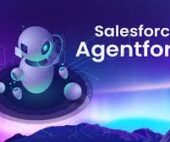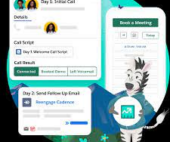What is a Sales Agent?
A sales agent is a key figure in a sales organization, representing the business’s products or services to customers. While the term is often used interchangeably with “sales representative,” it can also refer to independent contractors or reps from partner agencies. In the modern tech landscape, “sales agent” is increasingly used to describe AI-powered, autonomous applications that support sales efforts, such as lead nurturing and sales coaching.
Your Limitless Sales Team: From Pipeline to Paycheck
Scale effortlessly with Agentforce — your new digital workforce built on the Salesforce Platform.
Sales Agents vs. Sales Reps: What’s the Difference?
While “sales agents” and “sales reps” are often used interchangeably, some distinctions exist. A “sales agent” may refer to an independent contractor or an employee from a partner agency. However, in today’s technology-driven world, the term often refers to AI-driven sales applications that augment sales teams, reducing manual tasks and enhancing productivity.
What Does a Sales Agent Do?
A sales agent typically performs tasks traditionally handled by sales representatives or sales development representatives, such as engaging with leads, updating CRM systems, and closing deals. AI sales agents, however, function autonomously, managing tasks like lead nurturing, roleplaying sales conversations, and automating processes such as quoting and billing. These agents rely on self-learning, natural language processing, and deal data to carry out their tasks, allowing human sales teams to focus on building relationships and strategic decision-making.
Types of Sales Agents
Sales agents come in many forms, both human and AI-powered:
- Sales Representatives (Sales Reps)
Sales reps sell products and services to customers, guiding leads through the sales funnel. They usually receive a fixed salary plus commission on closed deals. - Sales Contractors or Partner Agency Hires
Some businesses work with external sales agents, often specialists in certain industries or niches. These agents bring valuable industry knowledge, allowing in-house teams to focus on higher-priority tasks. - Sales Consultants and Coaches
Sales consultants offer strategic advice to improve sales tactics, while sales coaches, often internal, train sales teams to improve specific skills, such as handling objections or refining pitches. - AI-Powered Sales Agents
AI agents handle repetitive, low-touch tasks such as lead outreach and follow-ups, freeing up human agents to focus on higher-value interactions. They operate autonomously, boosting efficiency and sales performance.
Benefits of Human and AI Sales Agents
- Scalability and Reach
AI sales agents can take over routine tasks, like nurturing leads, so human reps can focus on high-priority strategic work. - Cost Savings
AI agents help businesses maximize the potential of existing staff, reducing the need for additional hires. This results in significant cost savings compared to hiring external contractors or additional full-time employees. - Tailored Sales Approach
AI agents can deliver personalized outreach at scale, using CRM data and pre-set parameters to engage leads in a natural and productive way, ensuring every conversation is relevant.
Sales Agent Roles Your Company Should Hire
Depending on your needs, there are several roles to consider when building a sales team:
- Business Development Representatives (BDRs)
BDRs are responsible for generating and qualifying leads, typically through cold outreach. - Sales Development Representatives (SDRs)
SDRs support BDRs and sales reps by preparing leads, addressing initial questions, and booking meetings. - Sales Operations Professionals
These individuals analyze sales data and manage CRM tools to improve efficiency and sales processes. - Account Executives (Sales Reps)
Account executives build relationships, present solutions, negotiate contracts, and close deals. - Sales Managers
Sales managers oversee sales teams, set quotas, and provide coaching and training to ensure team success. - Sales Consultants
Sales consultants offer external expertise to fine-tune sales strategies and improve win rates. - AI Sales Agents
While not a role you can hire traditionally, AI agents play an invaluable part in augmenting the roles above by handling manual tasks, improving efficiency, and supporting sales teams.
Best Practices for Measuring Sales Agent Performance
Human and AI sales agents are measured on distinct sets of metrics:
- For Human Sales Reps
- Define clear KPIs, such as quota attainment, deal size, and sales velocity.
- Use real-time analytics to track progress and make adjustments.
- Provide regular feedback and training to optimize performance.
- For AI Sales Agents
- Measure the direct impact on sales outcomes, such as improved quota attainment or faster sales cycles.
- Track communication quality to ensure agents provide accurate, data-backed responses.
- Regularly review AI actions (like scheduling or record updates) for accuracy.
How Sales AI and Automation are Impacting the Role of Sales Agents
Sales teams face constant challenges in managing leads and closing deals. AI sales agents are transforming this landscape by automating time-consuming tasks, allowing human agents to focus on relationship-building and strategic decision-making. AI tools such as Agentforce can augment human teams by handling administrative tasks, allowing reps to focus on the human-centric aspects of sales.
Human and AI Sales Agents Leap into the Future
Human agents will always be vital in sales, but AI is rapidly becoming a powerful complement. As AI continues to evolve, human sales teams will work more closely with AI agents to handle more complex workflows, across more channels, in an increasingly seamless manner. The result? Stronger customer relationships, better engagement, improved retention, and increased sales volume.













